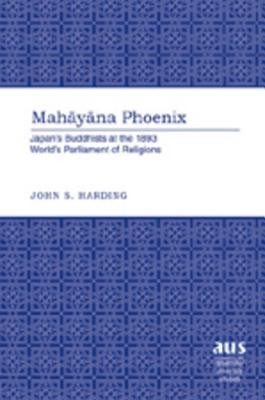
- We will send in 10–14 business days.
- Author: John Harding
- Publisher: Peter Lang Inc., International Academic Publishers
- ISBN-10: 1433101408
- ISBN-13: 9781433101403
- Format: 15.2 x 22.9 x 1.1 cm, kieti viršeliai
- Language: English
- SAVE -10% with code: EXTRA
Reviews
Description
The remarkable group of Japanese Buddhists who traveled to Chicago's Columbian Exposition to participate in the 1893 World's Parliament of Religions combined religious aspirations with nationalist ambitions. Their portrayal of Buddhism mirrored modern reforms in Meiji, Japan, and the historical context of cultural competition on display at the 1893 World's Fair. Japan's primary exhibit, the Hō-ō, or phoenix, Pavilion, provided an impressive display of traditional culture as well as apt symbolism: for Japan's modern rise to prominence, for Buddhist renewal succeeding devastating Meiji persecution, for Mahāyāna revitalization following withering attacks of Western critics, and for Chicago's own resurrection from the ashes of the Great Fire. This book examines the Japanese delegates' portrayal of Mahāyāna Buddhism as authentically ancient, pragmatically modern, scientifically consistent, and universally salvific. The Japanese delegates were active, and relatively successful agents who seized the opportunity of the 1893 forum to further their own objectives of promoting Japan and its Buddhism to the West, repairing negative evaluations of the «great vehicle» of Buddhism, differentiating Japanese Buddhism from the Buddhism of other countries, distinguishing their tradition as the evolutionary culmination of all religions, and shaping modern Buddhism in Asia and the West.
EXTRA 10 % discount with code: EXTRA
The promotion ends in 23d.07:26:44
The discount code is valid when purchasing from 10 €. Discounts do not stack.
- Author: John Harding
- Publisher: Peter Lang Inc., International Academic Publishers
- ISBN-10: 1433101408
- ISBN-13: 9781433101403
- Format: 15.2 x 22.9 x 1.1 cm, kieti viršeliai
- Language: English English
The remarkable group of Japanese Buddhists who traveled to Chicago's Columbian Exposition to participate in the 1893 World's Parliament of Religions combined religious aspirations with nationalist ambitions. Their portrayal of Buddhism mirrored modern reforms in Meiji, Japan, and the historical context of cultural competition on display at the 1893 World's Fair. Japan's primary exhibit, the Hō-ō, or phoenix, Pavilion, provided an impressive display of traditional culture as well as apt symbolism: for Japan's modern rise to prominence, for Buddhist renewal succeeding devastating Meiji persecution, for Mahāyāna revitalization following withering attacks of Western critics, and for Chicago's own resurrection from the ashes of the Great Fire. This book examines the Japanese delegates' portrayal of Mahāyāna Buddhism as authentically ancient, pragmatically modern, scientifically consistent, and universally salvific. The Japanese delegates were active, and relatively successful agents who seized the opportunity of the 1893 forum to further their own objectives of promoting Japan and its Buddhism to the West, repairing negative evaluations of the «great vehicle» of Buddhism, differentiating Japanese Buddhism from the Buddhism of other countries, distinguishing their tradition as the evolutionary culmination of all religions, and shaping modern Buddhism in Asia and the West.


Reviews